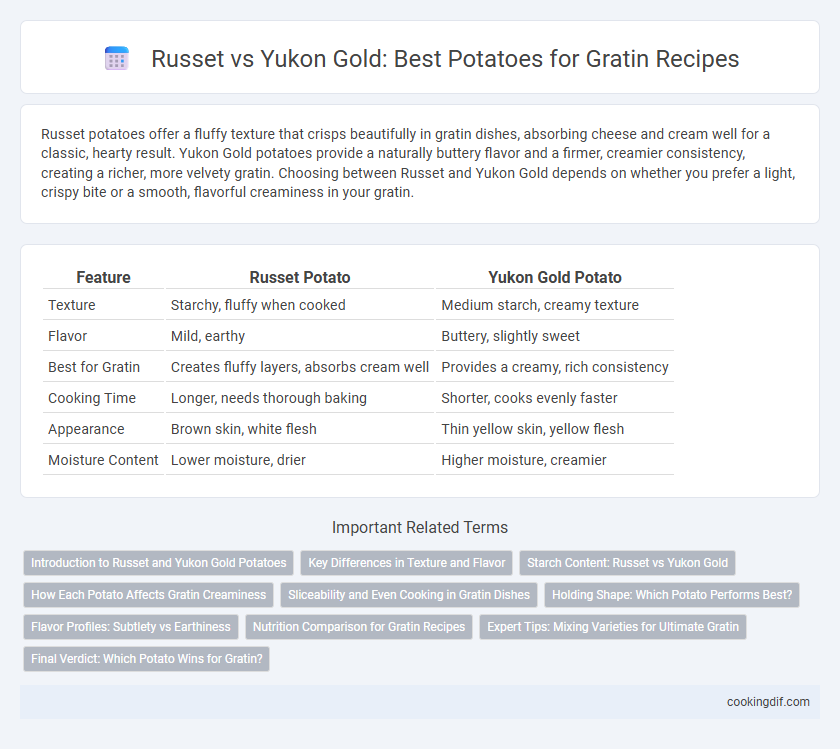Russet potatoes offer a fluffy texture that crisps beautifully in gratin dishes, absorbing cheese and cream well for a classic, hearty result. Yukon Gold potatoes provide a naturally buttery flavor and a firmer, creamier consistency, creating a richer, more velvety gratin. Choosing between Russet and Yukon Gold depends on whether you prefer a light, crispy bite or a smooth, flavorful creaminess in your gratin.
Table of Comparison
| Feature | Russet Potato | Yukon Gold Potato |
|---|---|---|
| Texture | Starchy, fluffy when cooked | Medium starch, creamy texture |
| Flavor | Mild, earthy | Buttery, slightly sweet |
| Best for Gratin | Creates fluffy layers, absorbs cream well | Provides a creamy, rich consistency |
| Cooking Time | Longer, needs thorough baking | Shorter, cooks evenly faster |
| Appearance | Brown skin, white flesh | Thin yellow skin, yellow flesh |
| Moisture Content | Lower moisture, drier | Higher moisture, creamier |
Introduction to Russet and Yukon Gold Potatoes
Russet potatoes feature a rough, brown skin and starchy white flesh ideal for creating crispy, fluffy gratins with a golden crust. Yukon Gold potatoes possess smooth, thin yellow skin and a creamy, buttery texture, offering a rich flavor and tender consistency perfect for gratin layers. Choosing between Russet and Yukon Gold depends on the desired balance of texture and flavor in classic potato gratin recipes.
Key Differences in Texture and Flavor
Russet potatoes have a high starch content that creates a light, fluffy texture ideal for achieving a crispy, golden gratin crust. Yukon Gold potatoes offer a creamier, waxy texture with a naturally buttery flavor, resulting in a richer, smoother gratin. Choosing between them depends on whether you prefer a firmer, hearty bite (Russet) or a creamier, melt-in-your-mouth consistency (Yukon Gold).
Starch Content: Russet vs Yukon Gold
Russet potatoes contain higher starch content, around 21%, making them ideal for creating fluffy, light gratins with a crispy top layer. Yukon Gold potatoes have a moderate starch level, approximately 16-18%, offering a creamier texture and richer flavor in gratins. The starch concentration in Russets helps achieve distinct, separated layers, while Yukon Golds produce a denser, more cohesive dish.
How Each Potato Affects Gratin Creaminess
Russet potatoes, known for their high starch content, absorb cream and cheese well, resulting in a fluffy yet creamy texture in gratins. Yukon Gold potatoes have a medium starch level and a naturally buttery flavor that enhances the richness and velvety creaminess of the dish. Choosing Russets yields a lighter, airier gratin, while Yukon Golds produce a denser, more luscious creaminess.
Sliceability and Even Cooking in Gratin Dishes
Russet potatoes offer a firmer texture that holds up well when thinly sliced, ensuring uniform layers ideal for gratin dishes. Yukon Gold potatoes provide a creamier consistency with a natural buttery flavor, and their thin skins make slicing easier while promoting even cooking. Choosing Yukon Gold helps achieve a balanced texture and consistent doneness, essential for perfect gratin results.
Holding Shape: Which Potato Performs Best?
Russet potatoes have a high starch content that causes them to break down and become creamy when baked, making them less ideal for gratins that require distinct, firm slices. Yukon Gold potatoes have a medium starch level, which helps them maintain their shape while still offering a buttery texture that enhances the dish. For gratins requiring consistent structure and slice integrity, Yukon Gold potatoes perform best by holding their shape throughout baking.
Flavor Profiles: Subtlety vs Earthiness
Russet potatoes deliver a mild, subtly sweet flavor that allows creamy gratin layers to shine without overpowering other ingredients. Yukon Gold potatoes offer a richer, earthier taste with a buttery undertone, enhancing the gratin's depth and complexity. Choosing between Russet and Yukon Gold affects the overall flavor profile, balancing subtlety against robust earthiness in potato gratins.
Nutrition Comparison for Gratin Recipes
Russet potatoes offer higher starch content and more fiber, supporting a fluffy texture in gratin while providing 2 grams of fiber per medium potato and about 110 calories. Yukon Gold potatoes deliver creamier, buttery flavor with slightly lower starch but richer in vitamins C and B6, contributing to immune support and metabolism with roughly 90 calories per medium tuber. Both varieties contribute essential potassium and antioxidants; choice depends on nutritional priorities like fiber intake or vitamin content for a balanced gratin recipe.
Expert Tips: Mixing Varieties for Ultimate Gratin
Combining Russet and Yukon Gold potatoes in gratin achieves the perfect balance of texture and flavor, where Russets contribute fluffy, absorbent qualities and Yukon Golds offer buttery creaminess. Experts recommend layering thinly sliced Russets for their starchy structure with Yukon Golds to create a rich, velvety finish that holds sauce beautifully. This mixture enhances browning while maintaining a tender interior, elevating the gratin's overall taste and presentation.
Final Verdict: Which Potato Wins for Gratin?
Yukon Gold potatoes win for gratin due to their creamy texture and balanced starch content, which provides a smooth, velvety finish. Russet potatoes, while starchier and firmer, can result in a denser, less cohesive gratin that may require longer cooking times. The buttery flavor and consistent moisture of Yukon Golds enhance the gratin's richness and help achieve the perfect golden crust.
Russet vs Yukon Gold for potatoes Infographic

 cookingdif.com
cookingdif.com